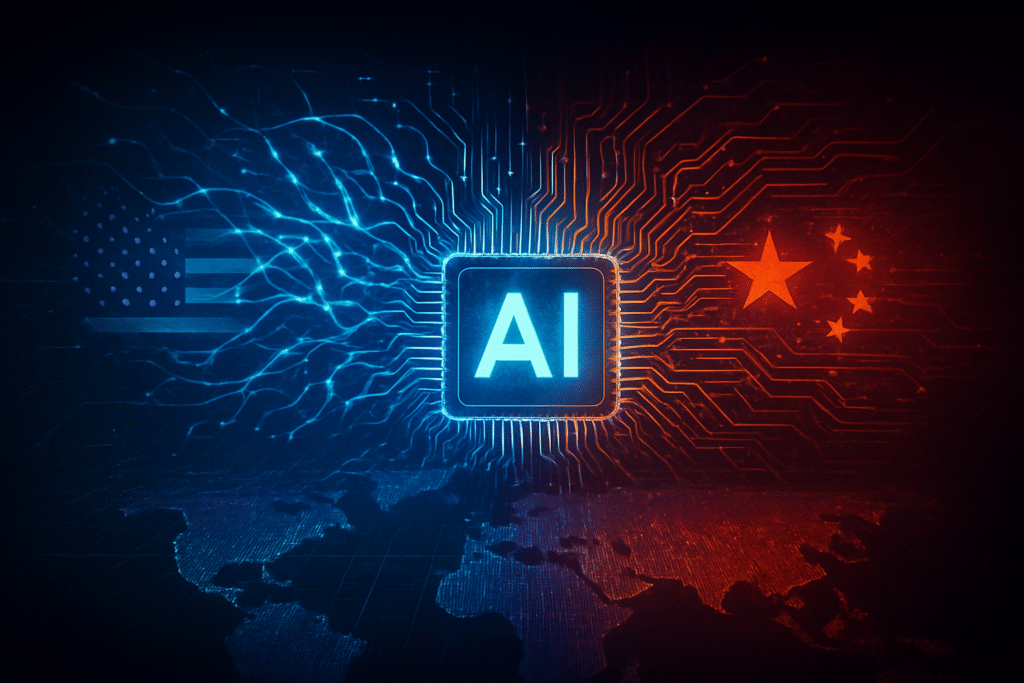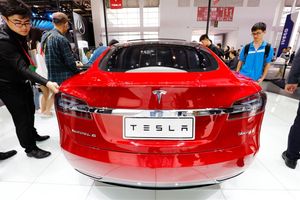
The United States has dramatically escalated its technological containment strategy against China, implementing a comprehensive ban on the sale of Nvidia's (NASDAQ: NVDA) most advanced Blackwell AI chips. This pivotal decision, publicly affirmed by the White House on November 4, 2025, aims to reserve cutting-edge AI capabilities for American enterprises and allies, sending shockwaves through the global artificial intelligence and semiconductor supply chains. The move signifies a hardening of the U.S. approach, transitioning from potential flexibility to a staunch policy of preventing China from leveraging advanced AI for military and surveillance applications, thereby accelerating a profound geopolitical and technological bifurcation.
This latest restriction follows a contentious period, with the specific controversy surrounding Nvidia's Blackwell chips intensifying in late October and early November 2025. On October 30, 2025, a planned deal for Nvidia to export Blackwell chips to China was reportedly blocked by U.S. officials. Subsequently, President Donald Trump publicly announced on November 3, 2025, that Nvidia's cutting-edge Blackwell AI chips would be reserved exclusively for U.S. companies. This decisive action underscores a strategic power play designed to safeguard U.S. leadership in AI and national security interests, fundamentally reshaping the future trajectory of AI development worldwide.
Blackwell's Technical Prowess and the Scope of the Ban
Nvidia's Blackwell architecture represents a monumental leap in AI chip technology, designed to power the most demanding AI workloads, particularly large language model (LLM) inference and training. Each Blackwell GPU boasts an astonishing 208 billion transistors, more than 2.5 times that of its predecessor, the Hopper GPU, and is manufactured using a custom TSMC 4NP process. Its dual-die design, connected by a 10 terabit-per-second (TB/s) chip-to-chip interconnect, effectively delivers the power of two GPUs in a single, cache-coherent chip.
The compute performance is groundbreaking, with a single chip capable of reaching 20 petaFLOPS. The GB200 Superchip, which integrates two Blackwell GPUs and a Grace CPU, achieves 20 petaflops of FP4 compute. Even more impressively, the GB200 NVL72 system, comprising 36 Grace Blackwell Superchips (72 B200 GPUs and 36 Grace CPUs), is engineered to function as a single massive GPU, promising a staggering 30 times faster real-time trillion-parameter LLM inference compared to its predecessor. Blackwell also supports up to 192 GB of HBM3e memory with 8 TB/s bandwidth, features a fifth-generation NVLink offering 1.8 TB/s total bandwidth, and incorporates a second-generation Transformer Engine for optimized LLM and Mixture-of-Experts (MoE) model training and inference with new precisions like FP4 AI.
The U.S. government's ban on Nvidia Blackwell chips, specifically targeting the most advanced processors including the GB200 and GB10 series, signifies a significant tightening of existing export controls. Previous restrictions, dating back to October 2022, targeted chips like the A100 and H100, and later extended to modified versions such as A800/H800 and H20, based on specific performance thresholds. Blackwell chips, with their extraordinary capabilities, far exceed these earlier thresholds, with a rumored China-specific B30A version reportedly outperforming the H20 by more than 12 times and exceeding current export control limits by over 18 times. This underscores a much higher bar for what is now considered export-controlled technology. Unlike previous iterations where Nvidia (NASDAQ: NVDA) developed "neutered" versions for the Chinese market, the current stance on Blackwell is more absolute, with the White House reaffirming that even scaled-down versions may not be permitted.
Initial reactions from the AI research community and industry experts, as of November 2025, reflect a mix of pragmatism, concern, and strategic adjustments. Many predict an intensified US-China tech rivalry, evolving into a new "arms race" that could redefine global power. Concerns have been raised that allowing even modified Blackwell chips for export could "dramatically shrink" America's AI advantage. Nvidia CEO Jensen Huang has publicly voiced optimism about eventual Blackwell sales in China, arguing for mutual benefits, but also acknowledged that tightening controls have effectively erased Nvidia's market share in China for advanced chips, dropping from an estimated 95% in 2022 to "nearly zero" by October 2025. Meanwhile, China is responding with massive state-led investments and an aggressive drive for indigenous innovation, with domestic AI chip output projected to triple by 2025.
Repercussions for AI Giants and Startups
The U.S. ban on Nvidia (NASDAQ: NVDA) Blackwell sales to China is fundamentally reshaping the global AI landscape, creating distinct advantages and disadvantages for various players. Chinese AI companies and tech giants, including Baidu (NASDAQ: BIDU), Tencent (HKG: 0700), Alibaba (NYSE: BABA), and Huawei, are significantly disadvantaged. These firms, which previously relied heavily on Nvidia's high-performance GPUs, face a severe slowdown in their AI development due to the inability to access Blackwell chips, critical for training large language models and advanced AI systems. Chinese regulators have even directed domestic companies to avoid purchasing Nvidia products, impacting sales of even modified, less powerful versions.
In response, China is aggressively pushing for self-sufficiency in AI chip production. The government is fostering local innovation and providing substantial subsidies, such as cutting energy costs for data centers that use domestic chips. Companies like Huawei (with its Ascend series), Biren Technology, Moore Threads, Alibaba (Hanguang 800), and Tencent (Zixiao) are developing domestic alternatives. Huawei's Ascend 910B, in particular, is noted as a formidable competitor rapidly narrowing the performance gap. While this may slow China's progress in the short term, it could catalyze long-term domestic innovation and resilience, potentially creating a robust homegrown AI chip ecosystem.
Conversely, U.S. AI companies and hyperscalers, such as OpenAI, Anthropic, and Palantir (NYSE: PLTR), stand to benefit significantly from exclusive access to Nvidia's most advanced Blackwell GPUs. This monopolization of next-generation AI computing power by the U.S. aims to ensure that future AI breakthroughs occur within its borders and among its allies, strengthening domestic leadership. The ban reinforces the technological leadership of U.S. AI labs, translating into faster AI model training and more sophisticated AI development, giving them a decisive head start in the global AI race.
The global market is increasingly splintering into two distinct technological blocs. While U.S. allies like South Korea may still access some Blackwell chips under approved export conditions, the most advanced variants are reserved for U.S. deployment. Nvidia has announced plans to supply 260,000 Blackwell units to South Korean firms, but the extent of access to top-tier chips remains uncertain. This situation may prompt non-U.S. providers to capitalize on the shift, leading to a reevaluation of enterprise AI architectures towards more heterogeneous and distributed computing globally. Enterprises, particularly those dependent on U.S.-origin AI accelerators, must anticipate supply constraints and consider diversifying their hardware vendors, while Chinese companies are forced to optimize for less powerful hardware or delay the rollout of advanced AI features.
A New Era of AI Geopolitics
The U.S. ban on Nvidia (NASDAQ: NVDA) Blackwell sales to China is more than a trade restriction; it's a pivotal moment, signaling an "irreversible phase" in the "AI war" between the two global superpowers. This action is a direct consequence of the intensifying competition for dominance in artificial intelligence, which both nations view as critical for national security, economic leadership, and future technological innovation. The U.S. strategy aims to restrict China's access to high-performance AI chips and manufacturing equipment, widening the technological gap and preventing adversaries from acquiring technology for military purposes.
This move is accelerating the fragmentation of the global AI ecosystem, leading to the emergence of two distinct technological blocs: a U.S.-led sphere and a separate, increasingly independent Chinese domestic ecosystem. This bifurcation will likely lead to parallel AI hardware and software stacks, compelling nations and companies to align with one system or the other. While it aims to bolster U.S. AI dominance, it also galvanizes China's efforts towards indigenous innovation, with Beijing aggressively pursuing self-reliance and investing heavily in its semiconductor industry. This "AI sovereignty" approach ensures China can shape algorithms for critical sectors even if it lags in cutting-edge chips.
Potential concerns arising from this escalation include significant market fragmentation, which forces global tech firms to choose between Chinese or U.S. hardware, potentially leading to less efficient and more costly parallel innovation ecosystems worldwide. There are fears that restricting access to advanced chips could slow the pace of global AI innovation due to reduced international collaboration and duplicated research and development efforts. Nvidia CEO Jensen Huang has warned that isolating Chinese developers could hurt American technology in the long run by ceding global AI talent to rivals. The "chip war" is increasingly seen as a form of geopolitical economic warfare, intensifying rivalries and reshaping international alliances, with China already responding with retaliatory measures, such as restricting the export of critical rare earth elements.
This development is considered a turning point in the global AI race, where access to high-performance computing resources will increasingly define a nation's competitive strength. Some analysts draw parallels to an "AI Sputnik moment," highlighting the intense race for technological leadership. Unlike previous AI milestones that often focused on breakthroughs in algorithms or processing power as purely technological advancements, the Blackwell ban signifies a shift where the availability and control of the most advanced hardware are explicitly weaponized as tools of statecraft. This marks a clear progression from strategic containment to "bloc formation" in the AI sphere, fundamentally altering how AI innovation will occur globally.
The Horizon: Challenges and Predictions
The U.S. ban on Nvidia (NASDAQ: NVDA) Blackwell sales to China is poised to profoundly reshape the global artificial intelligence (AI) and semiconductor supply chains for years to come. In the near term (late 2025 – 2026), while Nvidia anticipates offsetting revenue losses from China with soaring demand from American AI companies and allies, Chinese firms will face significant slowdowns in their AI development. This will further catalyze China's already robust drive for technological self-sufficiency, with Beijing actively implementing policies to boost domestic AI chip development, including substantial state subsidies. The global AI ecosystem will further splinter into distinct U.S.-led and China-led blocs, raising concerns about black-market smuggling networks for restricted chips.
Longer term (beyond 2026), the ban is expected to intensify technological decoupling and competition. China is likely to pursue a relentless quest for self-sufficiency, investing heavily in indigenous AI chip production and developing alternative AI architectures and software ecosystems. This could lead to a resilient, increasingly self-sufficient Chinese AI ecosystem, even if it means sacrificing efficiency or innovating through unconventional methods. The "chip war" is now seen as an integral part of a broader techno-economic rivalry, with 2027 cited as a pivotal year for potential increased tensions. The global semiconductor supply chain will undergo a significant restructuring, with efforts by the U.S. to de-risk and ensure critical AI components no longer run through Chinese hands, resulting in a bifurcated global technology market where strategic resilience often takes precedence over economic efficiency.
Nvidia's Blackwell chips are essential for powering next-generation large language models (LLMs) and other advanced AI systems, including those used in computer vision, natural language processing, and multi-modal AI, as well as demanding applications like simulating complex battlefield scenarios. In response to the ban, Chinese efforts are increasingly focused on developing specialized chips for a wider range of inference tasks, autonomous driving, and image recognition. Notably, Chinese scientists have unveiled a novel optical chip, ACCEL, which in laboratory tests reportedly achieves computing speeds 3,000 times faster and consumes 4 million times less energy than Nvidia's A100 for specific tasks. Such innovations, even if not immediately replacing general-purpose GPUs, could accelerate China's competitiveness in mass AI applications.
The ban presents numerous challenges. For enterprises globally, it introduces potential supply constraints and necessitates a re-evaluation of hardware sourcing. Chinese companies face the immediate challenge of overcoming the performance gap and higher energy costs associated with less efficient homegrown solutions. For the United States, a key challenge is preventing the unintended consequence of accelerating China's self-sufficiency efforts, which could ultimately weaken America's long-term AI leadership. Experts predict a continued path of technological decoupling, intensified competition, and a relentless pursuit of self-sufficiency. While China is expected to lag behind the absolute cutting edge for several years in some areas, its capacity for rapid advancement under pressure, coupled with significant state investments, means its progress should not be underestimated.
A Defining Moment in AI History
The U.S. ban on Nvidia (NASDAQ: NVDA) Blackwell sales to China marks a pivotal moment, signaling a new and "irreversible phase" in the "AI war" between the two global superpowers. This comprehensive restriction, publicly affirmed by the White House on November 4, 2025, is a clear declaration of technological sovereignty, shaping not only corporate strategies and national policies but also the future architecture of global intelligence. It is a strategic power play designed to safeguard U.S. leadership in AI and national security interests, fundamentally altering how AI innovation will occur globally.
The immediate significance lies in the explicit exclusion of Blackwell chips from China, drawing a firm line to maintain American AI dominance and prevent China from leveraging advanced AI processors for military and intelligence capabilities. Nvidia, while facing near-term revenue losses from what was a significant market, is recalibrating its focus, even as its CEO, Jensen Huang, expresses concerns that such isolation could ultimately harm U.S. innovation by ceding global AI talent to rivals. Crucially, China is accelerating its push for self-reliance, viewing these restrictions as a catalyst to achieve complete technological self-sufficiency in semiconductors and AI, with domestic companies making significant strides in developing alternatives.
This development's significance in AI history cannot be overstated. It marks a fundamental shift where the availability and control of the most advanced hardware are explicitly weaponized as tools of statecraft. This is a progression from strategic containment to "bloc formation" in the AI sphere, forcing a divergence in AI development pathways and potentially leading to two distinct technological ecosystems – one centered around advanced U.S. hardware and software, and another in China fostering indigenous innovation. This redefines the competitive landscape of AI for decades to come, moving beyond purely technological advancements to encompass geopolitical alignment and national security.
In the long term, the ban is likely to accelerate Chinese indigenous innovation, potentially leading to a self-sufficient AI ecosystem that could rival or even surpass the U.S. in specific AI applications. Global AI leadership will be redefined, with fragmented supply chains and R&D leading to increased costs and potentially slower global innovation if collaboration is severely hampered. Tech tensions will remain a defining feature of U.S.-China relations, extending beyond advanced chips to other critical technologies, materials (like rare earths), and even cloud services. The world is dividing not just by values, but by compute capacity, regulatory regimes, and software ecosystems.
In the coming weeks and months, watch closely for China's response and the progress of its domestic chip industry, particularly from companies like Huawei. Monitor Nvidia's alternative strategies and any new product lines aimed at mitigating market loss. The effectiveness of U.S. efforts to close "cloud services loopholes" and the responses of U.S. allies will be critical. Additionally, observe any shifts in rare earth and critical mineral controls, and the outcomes of future diplomatic engagements, which could influence the ongoing tech tensions and potential for de-escalation or further restrictions. The level of government subsidies and investment in domestic semiconductor and AI industries in both the U.S. and China will indicate the long-term commitment to decoupling or strengthening respective ecosystems.
This content is intended for informational purposes only and represents analysis of current AI developments.
TokenRing AI delivers enterprise-grade solutions for multi-agent AI workflow orchestration, AI-powered development tools, and seamless remote collaboration platforms.
For more information, visit https://www.tokenring.ai/.






